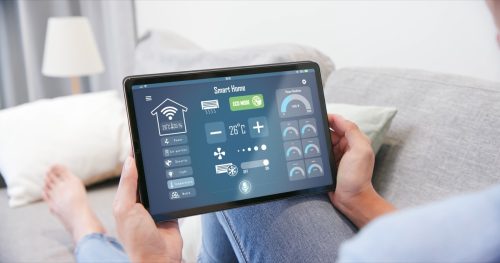6 Surprising Ways AI Can Improve Your Life After 50

While artificial intelligence (AI) was once an emerging technology, at this point it’s definitely here to stay. In fact, AI is more popular than ever, thanks to the launch of innovative tools like ChatGPT. But while this technology is already a part of everyday life, it may still seem foreign or even scary—and at any age, it can be overwhelming to know where to start. However, experts say if you’re over 50, this technology can help in ways you don’t even realize, including with tasks you don’t always want to perform yourself. Read on to discover six surprising ways that AI can improve your life after 50.
RELATED: How Turning Off Your Phone for 5 Minutes Can Protect You From Hackers.
1
It can help keep tabs on your health.

As we get older, our health takes top priority. Keeping track of regular check-ups is a chore on its own, and if you have a chronic condition, it’s that much more work to stay up to date with your symptoms and appointments. That’s where AI comes in.
“AI can help older adults monitor their health conditions and access timely diagnosis and treatment. For example, AI can help track vital signs, detect falls, diagnose diseases, recommend treatments, remind medications, and provide telehealth services,” Vivek K. Singh, associate professor of library and information science at Rutgers University, tells Best Life. “AI can also help older adults use voice-activated virtual home assistants to access health information, manage chronic conditions, and communicate with health providers.”
On top of that, AI can also introduce you to online health education and prevention programs, Singh adds.
Regarding mental health, Alicia Brown, computer scientist, policy expert, and founder/director at TMG Consulting Enterprise, notes that those over 50 may be particularly interested in an AI app called Woebot Health.
“Woebot [is] an AI-powered mental health chatbot that provides therapeutic conversations, check-ins, and exercises, fostering a sense of connection and support,” Brown explains.
RELATED: AI Has Changed the Way You Shop at Walmart and Sam’s Club—Here’s How.
2
It can assist you when traveling.

If you have extra time on your hands—or are lucky enough to have retired already—you might be doing more traveling. But if you’re getting to those far-off destinations you always dreamed of, you might encounter a language barrier. Thankfully, AI again has you covered.
“Many people travel often, either for work or especially after retirement. One challenge for those who love to travel is the language barriers in going to countries where one doesn’t speak the language,” James Hendler, DPhil, director of the Institute of Data, AI & Computing, and the Institute of Data Exploration and Applications at Rensselaer Polytechnic Institute, explains. “AI tools can already provide translations into many languages using your phone, and they are continually getting better.”
Hendler adds, “One of my favorites is that several applications on my phone can now, in real-time, translate a menu into English from just about any language. This means I don’t have to eat in places that cater to tourists, but can learn more about the real native cuisines and customs.”
RELATED: Creepy New AI Can Simulate Your Voice Perfectly After Hearing It for 3 Seconds.
3
It can help you stay connected.

After 50, you may have a specific group of friends that you’ve been close with for years. But if you’re retiring somewhere new or just feeling like you’ve outgrown your friends, it’s easy to feel somewhat lonely. However, experts say you can use AI to help combat those feelings.
“Using social networking and remote meeting applications, it is easier to stay in touch with family and friends—but what about making new friends, finding people who may share your hobbies, etc.? New AI tools are getting better at helping to connect people with those they might not be able to interact with in the real world, fostering social interaction and reducing feelings of isolation,” Hendler shares.
But while using AI for companionship can be a great way to combat loneliness, it’s not intended to replace loved ones, cautions Dor Skuler, AI expert and CEO and co-founder of Intuition Robotics and ElliQ (an AI social companion for people over 65).
“AI companion technology can help with companionship and gently suggest activities people should do to maintain or improve their health,” Skuler says. “This kind of AI is not replacing human companionship, but serving as a supplement to it and even helping to augment it by suggesting older adults speak with their loved ones more often.”
4
It can put online safeguards in place.

One of the biggest concerns in the digital age is the threat of scammers. In fact, in 2022, the Federal Bureau of Investigation (FBI) Internet Crime Complaint Center (IC3) received 800,944 complaints of bad cyber actors, including 300,497 reports of phishing. While those between the age of 30 and 39 recorded the most complaints, those over 60 lost the most money to these scams.
Criminals can actually use AI to attack you, but you can also use AI technology as a line of defense. According to Brown, there are actually AI platforms that can weed out phishing attempts so that you don’t have to.
“AI can provide enhanced online security, safeguarding older individuals from scams or phishing attempts, which they might be more susceptible to,” Brown explains.
RELATED: Scammers Are Targeting Older Adults in a Costly New Way, FBI Warns.
5
It can help you with tricky contracts.

Unless you have a career in finance or law, contracts and legal jargon can be tough to understand. Again, AI can make this easier.
MoneyGeek actually conducted a study to determine whether AI can help read wordy and complicated contracts. Researchers concluded that it can be of assistance—if you find the right platform.
As part of the study, researchers asked ChatGPT and Google Bard to explain text from a health insurance contract “in straightforward English.” ChatGPT’s response was still a bit confusing, but Google Bard gave a much clearer answer, complete with bullet points defining key terms.
The study notes that you might need to try out different programs to accurately interpret a complex contract, and you might need to fact-check the answers you get. Still, if the idea of translating legalese gives you a headache, it might be worth it to give AI a go.
For more helpful advice delivered straight to your inbox, sign up for our daily newsletter.
6
It can increase accessibility—if and when you need it.

If you’re in your 50s, you’re probably not too focused on assisted living. But when the time comes, it’s good to know that there are AI options to help you out.
“AI can help older adults live independently and safely in their own homes by providing smart home solutions. For example, AI can help control lighting, temperature, security, and entertainment systems according to the preferences and needs of older adults,” Singh says. “AI can also help alert caregivers or emergency services in case of accidents or emergencies.”
Additionally, if your hearing or eyesight aren’t what they once were, AI is an invaluable resource.
“For those with hearing, vision, or mobility impairments, AI can dramatically improve the accessibility of devices and services,” Brown says. “This includes things like voice-to-text software, predictive text, and AI-powered prosthetics or mobility aids.”